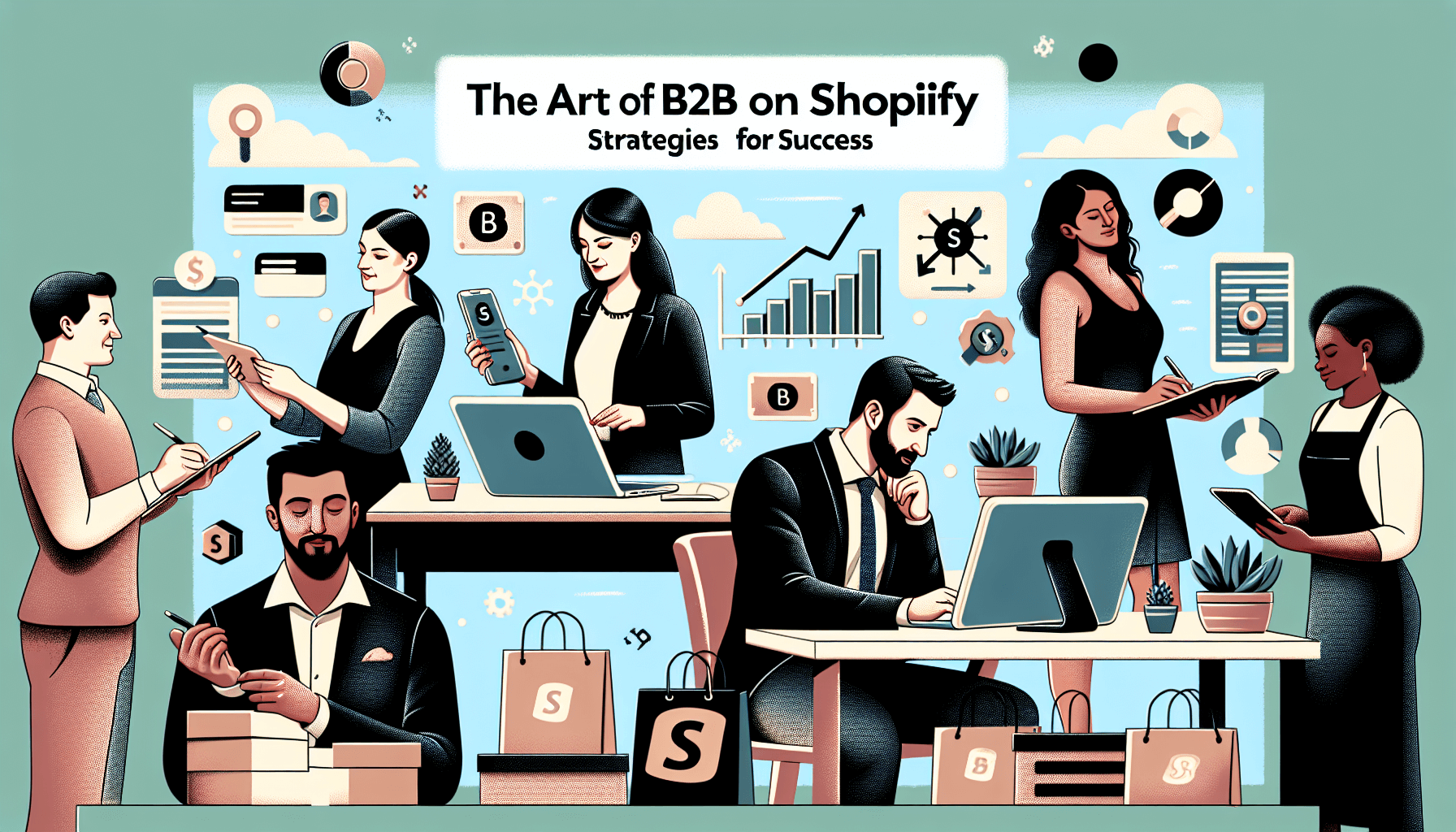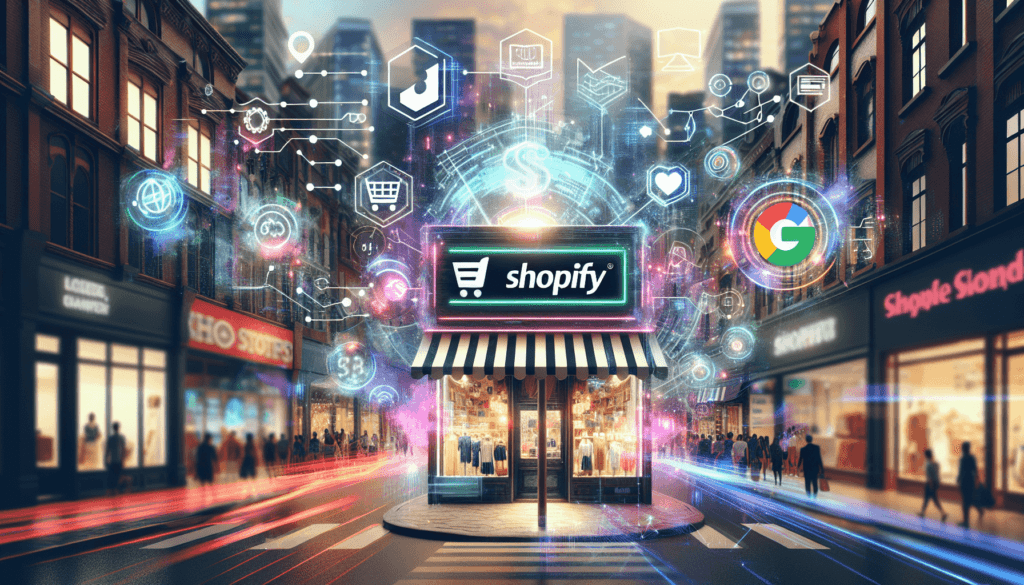B2B Shopify: Strategies for Success (2023)
 March 21, 2024
March 21, 2024 B2B e-commerce, focused on transactions between businesses, is a burgeoning market, with the global B2B e-commerce market surpassing $17.9 trillion in revenue for 2021 and showing significant growth from its $14.9 trillion valuation in 2020. Such figures highlight the escalating importance and the rapid expansion of B2B e-commerce, paving the way for specialized platforms that cater to this sector. Shopify, traditionally known for its B2C capabilities, has emerged as a robust platform for B2B Shopify, offering tailored solutions through Shopify B2B Ecommerce Development, aiming to optimize the B2B process for increased efficiency and expanded reach.
This strategic shift towards B2B Shopify includes introducing dedicated features like Shopify B2B Plus and wholesale Shopify Plus options, aligning with the need for dedicated stores that can handle the unique demands of B2B transactions. In addition, Shopify B2B Services and a team of Shopify B2B Experts provide businesses the tools and support needed to succeed in this competitive space. The upcoming sections will delve into transforming B2B strategies on Shopify, including the adaptation of B2B Shopify Plus, the custom B2B experience, challenges and solutions, and successful case studies that have utilized Optimised B2B Shopify for maximum effectiveness.
The Evolution of B2B Shopify e-commerce
The evolution of B2B e-commerce on Shopify has been marked by significant milestones that underscore the platform's growing commitment to serving the unique needs of B2B merchants. Here's a closer look at some of these key developments:
Market Growth and Shopify Plus Enhancements
- The B2B eCommerce market has seen explosive growth, projected to reach $1.2 trillion by 2021, doubling by 2024 .
- Shopify Plus merchants gained access to the wholesale sales channel in 2017, enabling price customization and user-level pre-set lists .
- A significant upgrade came with the acquisition of Handshake in 2019, which allowed B2B merchants to sell wholesale to D2C retailers, albeit initially limited to the US market .
Strategic Acquisitions and Feature Rollouts
- Shopify's acquisition of Deliverr in May 2022 marked a pivotal step towards simplifying logistics for wholesale merchants, integrating fast and cost-effective fulfillment solutions across ecommerce marketplaces .
- June 2022 saw the announcement of B2B on Shopify, introducing a suite of wholesale features built directly into the Shopify platform for Plus users, marking a long-awaited digital upgrade for B2B functionality.
Ongoing Evolution and Market Demand
- Shopify Plus's B2B solution has undergone significant evolution, introducing new features, capabilities, and APIs aimed at smoothing the management of complex B2B operations .
- This overhaul represents just the beginning, with further updates planned through 2024 to better meet the needs of B2B and enterprise merchants .
- The demand for B2B e-commerce services is expected to surge by approximately 80% by 2025, highlighting the critical need for platforms like Shopify to continually adapt and enhance their offerings .
This trajectory of development within Shopify's B2B offerings reflects a broader trend towards digitization in the B2B industry, where a significant portion of B2B buyers express comfort with making substantial digital transactions . Despite initial challenges, such as the lukewarm reception to Shopify B2B due to its separation from the core platform and limited customization options , Shopify has demonstrated a clear commitment to refining and expanding its B2B capabilities to better serve the evolving needs of the market.
Key Features of Shopify for B2B Business
Shopify has meticulously designed its platform to cater to the unique needs of B2B businesses, offering a suite of features that streamline operations and enhance the customer experience. Below are the key features that set Shopify apart for B2B commerce:
- Private and Secure Storefronts: Businesses can establish private storefronts that are password-protected, ensuring a secure shopping environment for B2B customers. This feature is crucial for maintaining the exclusivity and privacy of wholesale transactions .
- Tiered Pricing Structures: Shopify facilitates the implementation of tiered pricing strategies, allowing businesses to set different prices based on order quantities. This feature is beneficial for encouraging bulk purchases and rewarding high-volume customers .
- Shopify Plus Advanced Features:
- Multi-Channel Selling: Businesses can sell across various channels, including social media, online marketplaces, and even physical stores, broadening their reach and customer base .
- Automation Tools: Shopify Plus provides powerful automation tools, enabling businesses to streamline their operations and reduce manual tasks. These tools can automate processes like order fulfillment, inventory management, and customer segmentation .
- Scalability: With Shopify Plus, businesses have the infrastructure to scale their operations seamlessly. Whether it's handling spikes in traffic or expanding product lines, Shopify Plus ensures that businesses can grow without technological constraints .
- App Ecosystem: The Shopify App Store offers a wide array of applications designed to streamline order management and enhance store functionality. From inventory management apps to marketing tools, businesses have access to solutions that can be easily integrated into their Shopify stores.
- Payment and Shipping Flexibility: Shopify supports a diverse range of payment gateways and shipping providers, offering flexibility to both businesses and their customers. This feature ensures a smooth checkout process, regardless of the customer's location or preferred payment method.
- Comprehensive B2B Ecommerce Solution with Shopify Plus: This includes features tailored for B2B operations, such as wholesale channels with customized pricing, order processing capabilities, and management of wholesale customers. Additionally, Shopify Plus provides automation tools like Shopify Flow and Launchpad to enhance the customer experience and support business operations.
These features collectively contribute to making Shopify a robust and versatile platform for B2B businesses, enabling them to optimize their operations, provide exceptional customer experiences, and achieve scalable growth.
Customizing the B2B Experience on Shopify
Customizing the B2B experience on Shopify allows businesses to adapt their online store for different customer segments effectively. Here are key strategies to achieve this:
Context Customization:
- Default, Market, and B2B Contexts: Shopify provides three context options to tailor the store experience. The Default context applies universally unless overridden by specific settings in the Market or B2B contexts.
- Overrides for Custom Experiences: Changes made in the B2B context, for instance, won’t affect the Default or Market contexts, allowing for a unique shopping experience tailored to B2B customers.
- Adding Sections or Blocks: To customize a context, select it from the Context drop-down menu at the top of the page. You can then add or modify sections and blocks to suit the selected context.
Quick Order and Custom Checkout:
- Quick Order List Section: Enhances the shopping experience for B2B customers by facilitating bulk orders. This feature is available in free Shopify themes from version 11.0.0 onwards.
- Custom B2B Checkout Experiences: Utilize Shopify's Checkout UI extensions, available exclusively to Shopify Plus stores, to create bespoke checkout processes. These can be tailored based on customer type (B2B or D2C), company metafields, and whether the checkout submits a draft order.
Signup Forms and Metafields:
- Creating a B2B Signup Form: Shopify now enables the creation of signup forms for B2B stores, which helps in the approval process of new companies and customers. This is a critical step in managing B2B operations efficiently.
- Custom Form Fields and Data Collection: Customize the signup form by adding or removing fields, and by creating custom input types. This flexibility ensures that the necessary data is collected to facilitate B2B transactions.
- Placement and Management: After configuring, decide on the form's placement within the store. New company entries appear in the Shopify admin's Company list as unapproved, awaiting validation. This process is streamlined through Shopify's Forms app.
These customization options empower Shopify store owners to create a more tailored and efficient B2B shopping experience, enhancing customer satisfaction and operational efficiency.
Challenges and Solutions for B2B on Shopify
Navigating the landscape of B2B eCommerce on Shopify presents a unique set of challenges and solutions that businesses must consider to ensure success. Here are some of the key challenges identified, along with strategic solutions:
Challenges
Customization Needs:
- Problem: Users like michadrian1 and WhompWhomp express difficulties customizing their Shopify stores to display specific information for B2B wholesale product landing pages or differentiate product page templates for wholesale customers.
- Solution: Engaging with Shopify experts or developers for custom development is a viable solution. CelebritySmiles and WhompWhomp’s experience highlights the importance of working with skilled professionals to address these customization needs.
Product and Audience Targeting:
- Problem: Identifying the right products, targeting the correct audiences, and crafting effective sales and marketing messages are significant challenges. Allocating digital marketing budgets and building a paid ad strategy require careful planning.
- Solution: Utilizing eCommerce solutions like Surfer SEO for creating SEO-friendly content, establishing high-quality backlinks, and leveraging social media platforms can enhance market presence. Targeted advertising campaigns and engaging product descriptions are crucial.
Operational Complexities:
- Problem: B2B purchases on Shopify involve complexities such as handling various payment terms, purchase orders, and managing volume pricing. The inherent differences in B2B and DTC shopping experiences add to the challenge, with a significant portion of today’s business buyers being millennials and Gen Z, who expect seamless purchasing experiences.
- Solution: Implementing a cloud-based ERP system with an open and well-documented API can help manage high-volume data and complex back-office processes. Optimizing Shopify stores for different languages and centralizing orders into one system are effective strategies.
Solutions
Enhancing Customer Experience:
Implementing email marketing and loyalty programs, promoting transparency, and offering top-notch customer support can significantly increase brand loyalty and trust. These strategies help in retaining customers and ensuring a positive shopping experience.
Mastering the Art of Shipping:
Negotiating affordable shipping costs, offering a range of delivery options, and clearly communicating expected delivery times are essential steps to mastering shipping. This approach ensures customer satisfaction and streamlines the fulfillment process.
Data-Driven Decision Making:
Making use of Shopify’s included analytics or investing in sophisticated eCommerce programs like Google Analytics or Mixpanel allows businesses to analyze data expertly. Regularly testing new strategies and adjusting plans based on results enable informed decision-making.
Addressing these challenges with targeted solutions allows businesses to harness the full potential of B2B eCommerce on Shopify, paving the way for scalable growth and success in the digital commerce landscape.
Blended vs. Dedicated B2B Stores on Shopify
Choosing between blended and dedicated B2B stores on Shopify is crucial for businesses aiming to optimize their operations and customer experience. Here's a breakdown of the key differences and considerations:
Blended Stores
- Customer Types: Cater to both B2B and DTC customers within a single store and admin setup. This approach offers a unified experience but may limit customization for distinct customer needs.
- Default Settings for B2B: Includes restrictions like the inability to use discount codes or gift cards, sharing the same online store experience, login page, and most analytics as DTC customers. However, customization options are available to activate these features for B2B customers using the
customer.b2bliquid variable and theme code editing. - Efficiency and Branding: Offers a more efficient back-end experience due to shared data across B2B and DTC. Maintains the same branding for both customer types but allows for content contextualization. The inventory is shared across B2B and DTC orders, simplifying management but requiring careful stock planning.
Dedicated Stores
- Exclusive Use by B2B Customers: Designed solely for B2B transactions, allowing for extensive customization options such as discount codes, gift cards, Shopify Scripts for line item discounts, and tailored store theme and navigation settings. These stores can use different inventory systems or settings for selling when out of stock.
- Setup and Management: Requires creating a new store, setting up any existing integrations anew, and managing dedicated store settings separately. This could mean additional resources but offers a tailored experience for B2B customers.
- Customization and Analytics: Allows for B2B-specific branding customization and can tailor content for different markets using Shopify Markets. Provides focused reports for dedicated stores, helping in better decision-making with independent management of B2B-specific inventory.
Considerations for Both Formats
- Customized Product Selections and Checkout: Both store formats enable customized product selections based on customer context and customized payment and delivery options during checkout, ensuring a personalized shopping experience.
- Comprehensive Reports and Analytics: Shopify offers detailed reports and analytics for both formats, with combined data for blended stores and more focused reports for dedicated stores, aiding in strategic planning and performance monitoring.
In summary, the choice between blended and dedicated B2B stores on Shopify hinges on the specific needs of a business, including its operational preferences, desired level of customization, and the customer experience it aims to deliver.
Case Studies: Successful B2B Stores on Shopify
The success stories of B2B stores on Shopify highlight the platform's versatility and the potential for businesses to flourish. Here are a few noteworthy examples:
- 100% Pure utilized Shopify Plus to track inventory across international borders, showcasing the platform's robust inventory management capabilities.
- 2 Chainz leveraged Shopify Plus to reduce inventory risk and create multimillion-dollar products, demonstrating Shopify's scalability and flexibility for unique business models.
- 4ocean made the strategic decision to switch back to Shopify from BigCommerce to focus more on its core business, highlighting Shopify's superior user experience and business-centric features.
Further illustrating the platform's effectiveness:
- AMR Hair & Beauty significantly boosted its sales by 200% by taking advantage of Shopify's B2B functionality, showing the platform's capacity to cater to both B2C and B2B models seamlessly.
- Thrive Causemetics achieved a 13x increase in Shop app orders and acquired over 15,000 new customers in 2023 using Shop Campaigns, proving Shopify's powerful marketing tools and their impact on customer acquisition.
- OluKai saw a 12% increase in average order value and gained over 1,400 new customers during the holiday season by testing a new acquisition channel through Shop Campaigns, underlining the effectiveness of Shopify's marketing solutions.
These case studies not only highlight the diverse range of businesses thriving on Shopify but also underscore the platform's ability to support growth, streamline operations, and enhance customer engagement across various industries.
Conclusion
Throughout this comprehensive exploration of B2B e-commerce on Shopify, we've delved into the transformative strategies that companies can employ to not only succeed but thrive within the dynamic digital marketplace. The discussions ranged from the evolution of B2B e-commerce, highlighting Shopify's dedicated features and capabilities, to practical advice on customizing the B2B experience and overcoming common challenges. The insights provided underscore the critical importance of leveraging a platform as robust as Shopify to fully capitalize on the benefits of B2B online transactions. Through a combination of strategic planning and utilization of Shopify's expansive toolkit, businesses are poised to significantly enhance their operational efficiencies and customer experiences.
As underscored by the success stories shared, the potential for growth and expansion that Shopify offers to B2B enterprises is substantial. Whether considering the integration of advanced features or adopting a more tailored approach to customer engagement, the pathway to elevating a business's e-commerce capabilities is clear. Given the ever-evolving nature of the digital marketplace, continuously refining one's approach will be key to sustaining momentum and achieving long-term success. Ready to elevate your B2B ecommerce game? Contact Mgroup today for a free consultation. We'll discuss your specific needs and develop a tailored strategy to take your B2B brand to the next level, ensuring that businesses not only keep pace with the trends but set new benchmarks in the digital commerce landscape.
FAQs
What advantages does B2B offer on the Shopify platform? B2B on Shopify provides a dedicated set of features designed for business-to-business sales directly through your Shopify online store. This eliminates the need for third-party applications or complex workarounds. Key benefits include the ability to create customer-specific catalogs, establish payment terms, set preferred currencies, and manage multiple customer accounts and locations under one company profile.
What are the key elements of effective B2B content? Effective B2B content hinges on four main components: accurately identifying the target audience, producing high-quality content, determining essential metrics for success, and ensuring that the content aligns with the brand's positioning. Mastering these aspects is crucial for a successful B2B content strategy.
Can you list some effective B2B marketing strategies?
Certainly! Here are the top 10 B2B marketing strategies:
- Conduct thorough research as a foundation for all marketing activities.
- Focus on a niche-driven strategy to target specific markets.
- Maintain a high-performance website to engage and convert visitors.
- Implement Search Engine Optimization (SEO) to improve online visibility.
- Utilize social media platforms to connect and engage with your audience.
- Invest in advertising to reach a broader audience.
- Encourage referral marketing to leverage existing relationships.
- Use marketing automation, CRM, and lead nurturing tools to streamline processes.
What techniques lead to success in B2B sales?
To achieve success in B2B sales, consider these top 10 techniques:
- Research and understand your prospects thoroughly.
- Collaborate with other teams for a unified view of the customer.
- Leverage AI and machine learning to enhance sales efforts.
- Incorporate automation and self-service options for efficiency.
- Respond to customer queries promptly.
- Position yourself as a trusted advisor rather than just a sales representative.
- Focus on building strong relationships with clients.
- Work on earning the trust of your customers.








